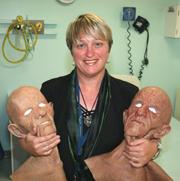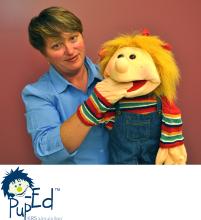Australia's masked educator now has skin in the game in America
Published on 06 Feb, 2012
Media Contact:For Immediate Release
A Los Angeles specialist produces hyper-realistic silicone masks used for Hollywood movies and Halloween props. This type of mask is so authentic that bank robbers have chosen to use them.
That same specialist has now teamed with an Australian academic to produce masks and associated body part props that are just perfect to provide nursing students with a simulated learning experience.

Dr Kerry Reid-Searl with some of her character masks
Click here to View/Download full-sized Image
The MASK-EDTM (KRS simulation) package goes way beyond supply of the masks and props to include the workshop-based training and techniques that make them so successful. MASK-EDTM simply means masking of the educator and masking of the educational process, whilst KRS is about knowledgeable, realistic and spontaneous simulation.
CQUniversity's Dr Kerry Reid-Searl, the instigator and champion of the package, recently visited Colorado State University, the first American campus to introduce the masked educator concept.
Hollywood Style Training in the Nursing Program from CSU-Pueblo TODAY on Vimeo.
True to the concept, Kerry was initially introduced to the students in the guise of retired butcher Cyril Smith, one of her favourite characters.
"Cyril has a grand-daughter doing nursing and he's been in and out of hospital himself so he reckons he knows enough to challenge the nursing students," Kerry says.
She explains there's a lot that needs to happen before the masked educator engages with students. They have to build their own experience into a character history as a platform for teaching. There's no script, so the educator has to be ready to really live the character.
"Plenty happens before the educator de-peels, de-roles and de-briefs their students," Kerry says.
True to form, Kerry was able to astonish and inspire a range of nursing students at Colorado State Uni. Her reputation is such that her Colorado colleagues spent 18 months enticing her to present the package in person.
LINK to Nursing school has a new take on role playing
The American educators were also very receptive to Kerry's latest teaching tool called Pup-EdTM (KRS simulation)*, which enables the educator to inhabitat the role of a sick child by using a puppet.

Kerry with one of the puppet resources and the new educational resource logo
Click here to View/Download full-sized Image
"With the child/puppet the nursing students change their mindset and responses so they can engage and learn in a more authentic way," Kerry says.
JoAnn Crownover from Colorado State Uni says her first exposure to Kerry and her innovative simulation strategy was back in September, 2010.
"I was convinced at that first meeting that her simulation technique was going to change the face of simulation," JoAnn says.
"The masks and props that Kerry uses are so life-like that it is easy and natural to relate to the character as a real person.
"I have been doing simulation for years using high fidelity manikins. Although I do believe that the manikins provide tremendous learning opportunities for the student nurses, I always have some students who have difficulty relating to the manikin as if it is a real patient.
"MASK-ED will provide all students with an opportunity to care for a real patient in a safe learning environment. The students, faculty and community of CSU-Pueblo were all extremely impressed with Kerry Reid-Searl and Lea Vieth from CQUni as they demonstrated the teaching-learning technique.
"Following one of their presentations, I had one nursing student who stated that she felt so lucky to be a student at this University because of the innovative teaching strategies. I predict that as soon as the United States nursing educators are exposed to MASK-ED, it will be in great demand."
As part of her USA visit, Kerry was delighted to visit the Los Angeles factory which now produces her masks and props including authentic-looking wounds, injectible arms, breasts, abdomens, torsos, genitalia, and even colostomies.
She says the manufacturer is being profiled soon by a major American news network, including a focus on the educational potential of his products.
"Whilst the props hide the face of the educator, the skill is in knowing how to use this technique. Hence it is fundamental that the educator is prepared with the educational resources that Kerry has created," Kerry says.
"We believe MASK-ED has application not only for nursing and health settings but in any learning situation involving a patient or client relationship.
"You don't have to be a trained actor to use the mask and props but we can train educators to ensure they can totally transform into a character with a back story who is able to help create the right educational outcomes."
* Pup-EdTM (KRS simulation) is a teaching technique where puppets are worn by a wearer who is an informed professional. Pup-EdTM (KRS simulation) is an acronym for the teaching approach developed for the technique.
The acronym stands for P-puppet and professional preparation, U- understanding the learner, P-play in action to suspend disbelief, E- evaluation, D- debrief. The KRS component stands for knowledgeable, realistic and spontaneous simulation.
The 'knowledgeable' implies that the wearer of the puppet has a deep understanding of the content being imparted as well as an understanding of different learning styles in order to develop strategies in the puppet experience to engage the learners.
'Realistic' suggests that the puppet experience mimics a real situation and the learner is suspended in disbelief. The reality comes from the experience of the wearer who should have a deep understanding of their discipline and simulation. For example in nursing, the professional wearing the puppet - (being the nurse), can draw upon episodes of patient care relevant to the content, the objectives of the episode and learner level.
'Spontaneous' implies that the reaction of the puppet is unprompted. However, the puppet is directed by the professional who is, in turn, influenced by the learner response. Because scripts are not set, the reactions can be immediate in response to learners.
The purpose of this technique is for the professional to use puppets as a means to engage, teach, play and communicate with learners.
The puppets can be used in different contexts and the learners can be diverse. For example the learners could be university nursing students in a classroom; children in a paediatric unit, children in a classroom with differing needs or a child undergoing counselling.
The informed professional could be a nurse educator teaching undergraduate nursing students, the experienced registered nurse in the paediatric unit, the teacher in the classroom or the psychologist in a counselling session with a child. The contexts can, in essence, be any setting involving children or where there is a need for teaching individuals who will be involved with children.
ENDS

